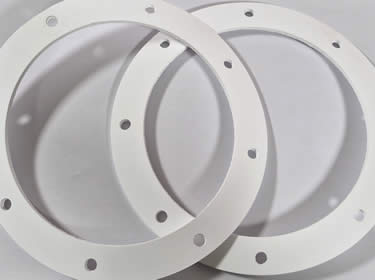Expanded PTFE Gaskets


Expanded PTFE Gaskets: The High-Performance Sealing Solution for Demanding Environments
Call 0121 544 5808 Today
Bespoke Manufacturing
Instant Quote Service
Worldwide Delivery
Various Gauges/Thicknesses
Bespoke Manufacturing
Instant Quote Service
Worldwide Delivery
Various Gauges/Thicknesses
Call us: +44 (0)121 544 5808
Email us: sales@stephensgaskets.co.uk
What Are Expanded PTFE Gaskets?
Expanded PTFE (Polytetrafluoroethylene) gaskets are high-performance sealing materials that provide chemical resistance, thermal stability, and flexibility for industrial applications. Unlike standard PTFE, expanded PTFE is mechanically processed to create a fibrous, interlocking structure that enhances its compressibility and adaptability.
- Compatible with almost all chemicals, acids, and solvents
- Wide temperature resistance from -200°C to +260°C
- Easily conforms to rough, misaligned, or damaged flange surfaces
- Low creep and high stress recovery for long-term sealing
- FDA-approved for food, pharmaceutical, and medical applications
Expanded PTFE gaskets are used where traditional materials fail, ensuring reliable, leak-free sealing in harsh and extreme operating conditions.
Why Choose Expanded PTFE Gaskets?
1. Exceptional Chemical Resistance
- Withstands exposure to strong acids, bases, and solvents
- Suitable for corrosive chemical processing applications
2. Wide Temperature Range
- Operates in cryogenic conditions down to -200°C
- Handles high temperatures up to +260°C
3. Outstanding Sealing Capability
- Expanded structure fills irregular or rough surfaces for a complete seal
- Provides tight sealing under low bolt loads, ideal for delicate or fragile equipment
4. Long-Term Durability and Stability
- Low creep and high stress recovery prevent leaks over time
- Withstands continuous pressure and temperature fluctuations
5. Non-Stick and Easy to Remove
- Does not adhere to flanges, making removal and maintenance simple
- Prevents material buildup on flange surfaces
6. FDA-Approved and Non-Toxic
- Complies with food and pharmaceutical safety regulations
- Safe for sterile, hygienic applications
7. Compatible with a Wide Range of Flange Materials
- Works effectively with steel, plastic, glass, and composite flanges
- Suitable for liquids, gases, and aggressive chemicals
8. Cost-Effective and Low Maintenance
- Longer lifespan than standard gaskets, reducing replacement frequency
- Minimises leaks and inefficiencies, improving system performance
Where Are Expanded PTFE Gaskets Used?
- Seals reactors, pipelines, and pumps handling corrosive chemicals
- Resistant to highly aggressive fluids, acids, and solvents
- Used in offshore platforms, refineries, and pipeline joints
- Withstands high pressures, temperatures, and exposure to hydrocarbons
- FDA-compliant for use in food production and bottling plants
- Prevents contamination in sanitary processing lines
- Ensures sterile, contamination-free sealing in drug manufacturing
- Used in autoclaves, sterile fluid transport, and cleanroom environments
- Provides reliable sealing for steam turbines, gas pipelines, and boilers
- Performs well in high-temperature and fluctuating pressure conditions
- Chemical-resistant sealing for chlorine and acid dosing systems
- Used in pumps, filtration units, and industrial wastewater treatment plants
- Lightweight and durable for fuel, hydraulic, and exhaust systems
- Withstands vibration, pressure changes, and extreme temperatures
- Used in cleanrooms and precision manufacturing
- Provides non-contaminating sealing for semiconductor processing equipment
- Seals pumps, compressors, and ventilation systems
- Ensures leak-free performance in liquid and gas transportation systems
Call us now: +44 (0)121 544 5808
Common Issues and Solutions for Expanded PTFE Gaskets
Higher Initial Cost
- Issue: Expanded PTFE gaskets cost more than traditional rubber or fiber gaskets
- Solution: Their long lifespan, chemical resistance, and reduced maintenance needs make them more cost-effective over time
Limited Mechanical Strength
- Issue: Softer than metal-reinforced gaskets, making them susceptible to deformation under extreme pressure
- Solution: Use reinforced PTFE gaskets for high-pressure applications
Overcompression Risk
- Issue: Excessive bolt load can cause gasket extrusion or reduced sealing effectiveness
- Solution: Follow precise torque specifications during installation to avoid over-tightening
Not Ideal for Ultra-High-Pressure Steam Systems
- Issue: Works well under moderate pressure, but not suitable for extremely high-pressure applications
- Solution: Consider alternative high-strength gasket materials for ultra-high-pressure environments
Requires Proper Surface Preparation
- Issue: Performance depends on flange condition and proper alignment
- Solution: Ensure flange surfaces are clean, smooth, and correctly aligned before installation
How to Select the Right Expanded PTFE Gasket
To maximise performance, consider:
- Temperature range (-200°C to +260°C)
- Chemical exposure (acids, solvents, hydrocarbons)
- Pressure conditions (low, medium, or high-pressure sealing)
- Flange surface condition (rough, misaligned, or damaged surfaces)
Contact Us for tailored recommendations: +44 (0)121 544 5808
FAQs
What makes expanded PTFE different from standard PTFE?
Is expanded PTFE suitable for high-pressure applications?
Are expanded PTFE gaskets food-safe?
How long do expanded PTFE gaskets last?
How do I order expanded PTFE gaskets?
Call us today for expert guidance: +44 (0)121 544 5808
Why Choose Stephens Gaskets for Expanded PTFE Gaskets?
- Decades of expertise in gasket manufacturing
- Custom sizing and bulk production capabilities
- Fast turnaround times and expert technical support
- Gaskets compliant with industry safety and quality standards
